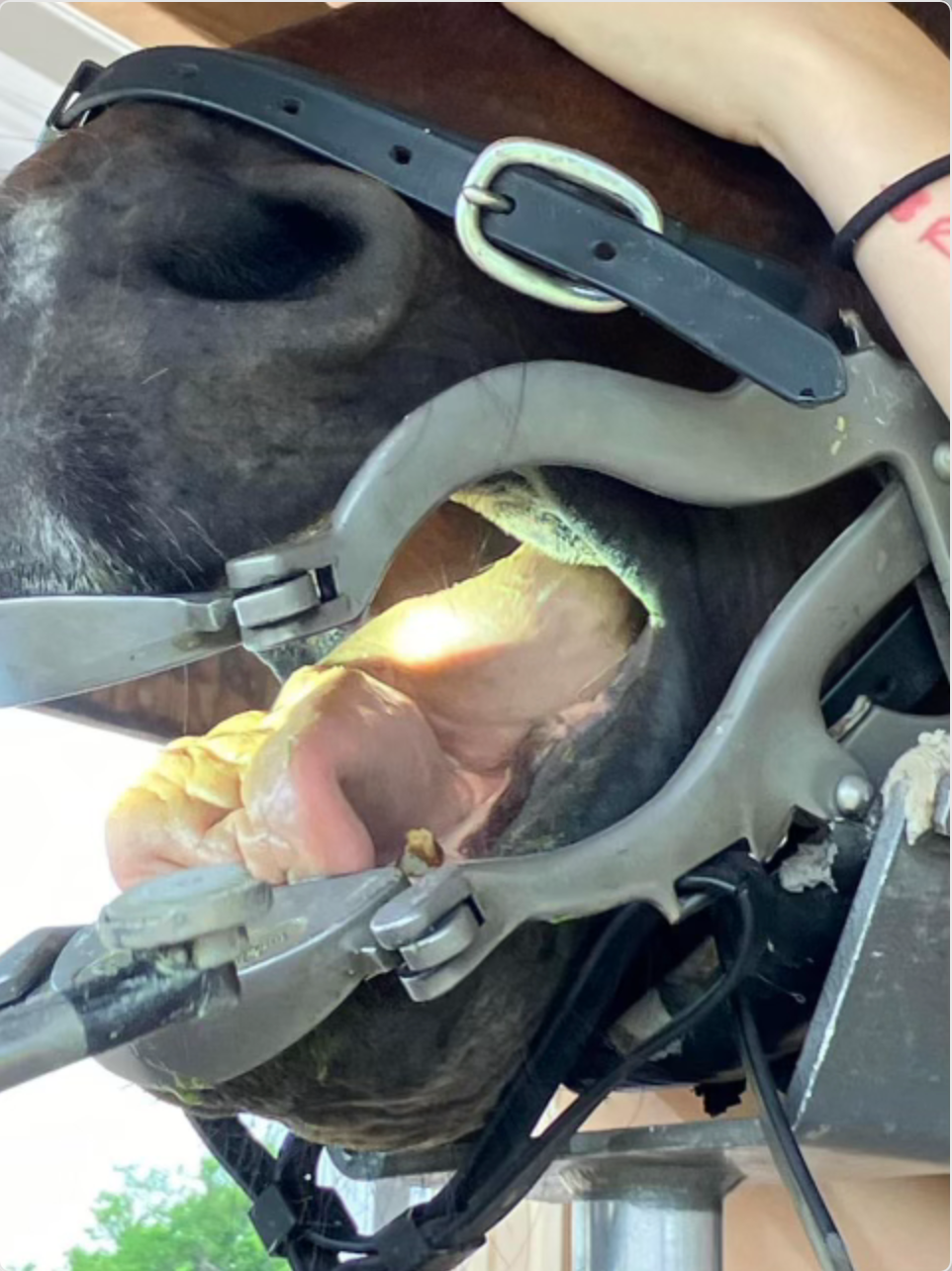Understanding and Caring for Horse Teeth – Key to Your Horse's Overall Health
- Kim Williams

- Jun 27, 2024
- 4 min read
Updated: Nov 27, 2024
Taking care of your horse involves many aspects, but one that’s often overlooked is dental care. Just like humans, horses require regular attention to their teeth to maintain overall health and well-being. Horse teeth are unique, and their growth, care, and potential issues—such as the presence of wolf teeth—play a significant role in your horse’s comfort, ability to eat, and performance.

How Horse Teeth Grow
Unlike human teeth, horse teeth continue to grow throughout their lives. A young horse is born with a set of deciduous (baby) teeth, which are gradually replaced by permanent teeth by the time they are about 5 years old. Afterward, the horse’s teeth continue to erupt from the gums over time to compensate for the constant wear caused by chewing roughage like hay and grass. This continuous growth means that dental care is a lifelong necessity for horses.
Horses’ teeth are designed for grinding fibrous food, and the surfaces of the teeth can wear down unevenly. If left unchecked, this can cause sharp edges or hooks that might interfere with proper chewing, leading to discomfort, poor digestion, or even weight loss.

Dental Care for Horses
Routine dental care is crucial to prevent potential issues. Most horses should have a dental check-up at least once a year, although young horses with developing teeth or older horses with uneven wear might need more frequent attention. During a dental exam, the veterinarian will check for sharp edges, hooks, and any signs of infection or abnormal wear. They will likely perform a procedure called floating, where the sharp edges of the teeth are filed down to ensure the horse can chew properly and avoid discomfort.
In addition to floating, dental care may involve addressing loose or cracked teeth, realigning the bite, or extracting problematic teeth. Addressing dental issues early on is essential for preventing more serious complications like difficulty chewing, weight loss, or behavioral issues related to pain.

What is a Wolf Tooth and Why Remove It?
One dental issue that often arises is the presence of wolf teeth. Wolf teeth are small, vestigial teeth that typically appear in front of the first molar, usually on the upper jaw, and occasionally in the lower jaw. While not all horses have wolf teeth, around 70% of horses develop them, often between 5 to 12 months of age.
Wolf teeth don’t have a specific function, and they can cause problems when horses are ridden or driven with a bit. The bit may press against the wolf tooth, causing pain and discomfort. For this reason, many veterinarians recommend removing wolf teeth before the horse is introduced to bit training. The extraction is a relatively simple procedure performed by a veterinarian, and once removed, it prevents potential discomfort during riding.

The Connection Between Dental Health and Overall Health
Your horse’s dental health is closely linked to its overall health. A horse with dental issues may experience discomfort that can lead to problems like difficulty chewing and digesting food properly. When horses can't chew their food correctly, they may not get the nutrients they need, leading to weight loss or malnutrition. Additionally, improperly chewed food can increase the risk of choke, colic, or impaction, which are serious and potentially life-threatening conditions.
Behavioral issues, such as head tossing, resistance to the bit, and irritability, can also stem from dental discomfort. When a horse is experiencing dental pain, it can affect their performance and demeanor, making it difficult to ride or handle them. Proper dental care can prevent these issues, ensuring your horse is comfortable, healthy, and performing their best.
Veterinary Procedures for Horse Teeth
When it comes to veterinary procedures for horse teeth, routine floating is the most common. This is typically performed using either manual or powered dental tools, and the horse is usually sedated for comfort and safety. Floating prevents sharp points or edges from forming and ensures an even surface for chewing.
In addition to floating, your veterinarian may perform tooth extractions when necessary. Besides wolf teeth, horses can develop loose or damaged teeth due to age, trauma, or dental disease. In these cases, tooth extraction is sometimes required to prevent infection or further complications.

Signs Your Horse Might Need Dental Care
Horses often exhibit specific signs when they are experiencing dental issues. If you notice any of the following, it might be time for a dental check-up:
Difficulty chewing or dropping food (known as quidding)
Weight loss despite normal feeding
Head tossing or resistance when being bridled or ridden
Foul breath or excessive drooling
Swelling around the jaw or mouth
Nasal discharge, which can indicate dental infection
Being aware of these symptoms and addressing dental care proactively can help your horse avoid unnecessary pain and complications.

The Benefits of Maintaining Horse Dental Health
Maintaining your horse's dental health has a direct impact on their overall health, performance, and quality of life. Regular dental care ensures that your horse can eat and digest food properly, reducing the risk of digestive issues. It also helps to prevent behavior problems that may arise from dental pain or discomfort during bridling and riding. Most importantly, proper dental care contributes to your horse’s longevity and well-being.
Conclusion
Your horse’s dental health plays a vital role in its overall well-being. By ensuring regular dental check-ups and addressing issues such as wolf teeth or uneven wear, you can help your horse stay healthy, happy, and pain-free. Proper dental care is a key part of responsible horse ownership, and understanding how to maintain it will benefit both you and your equine companion for years to come. If you haven’t scheduled your horse’s next dental check-up, consider reaching out to your veterinarian today to keep your horse’s teeth in top shape!









Comments